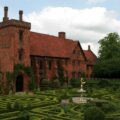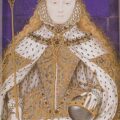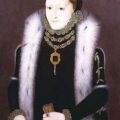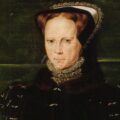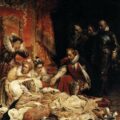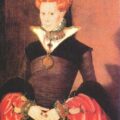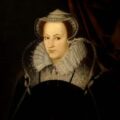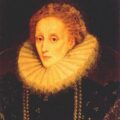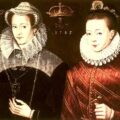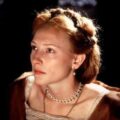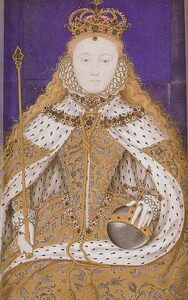
On hearing the news of the Queen’s death, “all London sung and said Te deum laudamus in every church”2. It was the beginning of a new era, the reign of a new queen, Elizabeth I.
On the 17th November 1558, the day of Mary’s death, Parliament was in session and at around noon the Houses of Lords and Commons met at Whitehall to formally proclaim Elizabeth Queen of England. Sir Nicholas Throckmorton writes of how, in the meantime, he rode from London to Hatfield with Mary’s ring to give to Elizabeth as proof of her half-sister’s death and we know that members of the council also made their way to Hatfield that day to give Elizabeth the news. There are two different accounts of what happened that day at Hatfield:-
“This is the Lord’s doing: it is marvellous in our eyes.”
Alison Weir, in her book “Elizabeth the Queen”, tells the first story:-
“Here [at Hatfield], as noon approached, the princess, unheeding of the bitter cold, was taking the air in the park surrounding the palace, seated beneath an old oak tree, reading a book.
She was not aware of her imminent change of status. For several days now, courtiers and councillors with an eye to the future had been deserting the court of the dying Queen Mary and wending their way north to Hatfield to demonstrate their loyalty to her youthful heiress. Yet, when the lords of the Council came and knelt before her in the park, saluting her as their sovereign lady, Elizabeth was for a few moments speechless. Struggling with her emotions, she sank to her knees on the grass, and pronounced in Latin, “This is the Lord’s doing: it is marvellous in our eyes.[Psalm 118]”
Then she rose and, having recovered her composure, led the way back to the palace to receive the acclaim of her people and begin the business of ruling England.”3
I am God’s creature, ordained to obey
David Starkey writes of an alternative story, that recorded by Sir John Harington, Elizabeth’s godson. Starkey writes of how the speech entitled “Words spoken by the Queen to the lords at her accession” are normally assigned to the 20th November but that they are more likely to have been spoken on the 17th. This is what Elizabeth said:-
“My lords, the law of nature moveth me to sorrow for my sister; the burden that is fallen upon me maketh me amazed; and yet, considering I am God’s creature, ordained to obey His appointment, I will thereto yield, desiring from the bottom of my heart that I may have assistance of His grace to be the minister of His heavenly will in this office now committed to me. And as I am but one body naturally considered, though by His permission a body politic to govern, so I shall desire you all, my lords (chiefly you of the nobility, everyone in his degree and power), to be assistant to me, that I with my ruling and you with your service may make a good account to almighty God and leave some comfort to our posterity in earth. I mean to direct all my actions by good advice and counsel. And therefore, considering that divers of you be of the ancient nobility, having your beginnings and estates of my progenitors, kings of this realm, and thereby ought in honour to have the more natural care for maintaining of my estate and this commonwealth; some others have been of long experience in governance and enabled by my father of noble memory, my brother, and my late sister to bear office; the rest of you being upon special trust lately called to her service only and trust, for your service considered and rewarded; my meaning is to require of you all nothing more but faithful hearts in such service as from time to time shall be in your powers towards the preservation of me and this commonwealth. And for council and advice I shall accept you of my nobility, and such others of you the rest as in consultation I shall think meet and shortly appoint, to the which also, with their advice, I will join to their aid, and for ease of their burden, others meet for my service. And they which I shall not appoint, let them not think the same for any disability in them, but for that I do consider a multitude doth make rather discord and confusion than good counsel. And of my goodwill you shall not doubt, using yourselves as appertaineth to good and loving subjects.”4
In this speech, Elizabeth makes various points:-
- She expresses her sorrow for Mary’s death
- She expresses her desire to do the best in the office to which she has been called by God
- She asks for the assistance of the nobility
- She thanks three groups: the pre-Tudor nobility, nobles who had been ennobled by her father, brother and sister, and those who had followed and advised Mary
- She makes it clear that there will be what Starkey calls “a heavy cull” and that she will only appoint those “I shall think meet”
- She consoles those who will not be appointed
The very next day, Elizabeth met with her advisers and members of Mary’s ex council. The reign of Elizabeth I had begun.
Notes and Sources
- Elizabeth, David Starkey, p236
- Ibid.
- Elizabeth, the Queen, Alison Weir, p1
- Elizabeth I: Collected Works, p51-52
*Linda Porter says 7am, David Starkey and Anna Whitelock say between 5 and 6am. No one is sure of the exact time.
